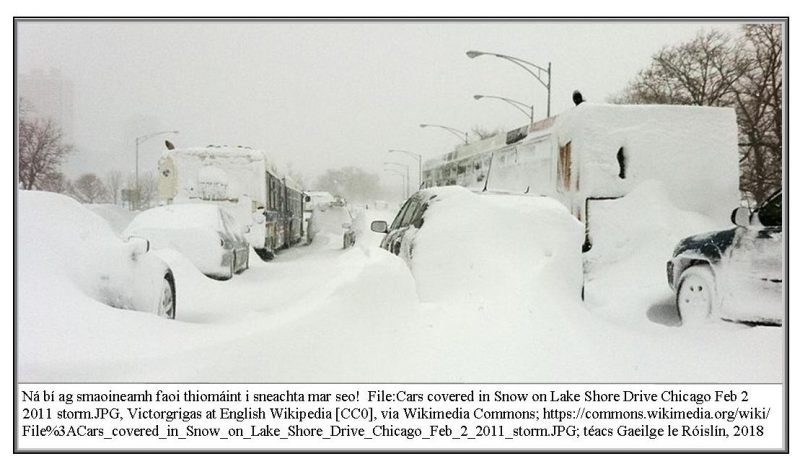Nuair a bhíonn an aimsir go dona — some Irish words for winter weather conditions and equipment Posted by róislín on Jan 29, 2018 in Irish Language
(le Róislín)
Bhuel, is é an t-am sin den bhliain é. Well, it’s that time of year. Listening daily, even hourly, for the weather report to see what driving will be like. Depending on where you live, the big question may be whether you’ll have snow (sneachta), rain (fearthainn or báisteach), or sleet (flichshneachta).But, of course, winter weather vocabulary goes far beyond those three terms. So let’s try a few of them in a matching game. Here are 10 English words, including 2 sets of pairs, and 11 Irish definitions. The extra one is added to increase the “dúshlán” (challenge). Tá na freagraí (answers) thíos (below), mar is gnách.
Banc Focal: a) black ice b) de-icer c, d) pothole (x2) e) slush f) snow blower g) snow plough (US: snow plow) h) snow tire i, j) to skid (x2)
1)) bogoighear
2)) bonn sneachta
3)) céachta sneachta
4)) dí-oighreoir
5)) loiceadh
6)) oighear dubh
7)) poll sa bhóthar
8)) sciorradh
9)) sclaig
10)) séidire sneachta
11)) sleamhnú
Before we jump to the answers, let’s consider a few more issues about winter vocabulary.
The word “flichshneachta,” is a little tricky, because “sleet” means different things in Ireland and the UK as opposed to in North America. “Flichshneachta” is a combination of “fliuch” (wet) + “sneachta” (snow). In Irish and British English, “sleet” is snow and rain mixed. In North American English, “sleet” is actual icy pellets, precipitation that freezes as it falls. Sleet, either interpretation, is also is different from freezing rain, which doesn’t freeze till it hits the cold surface of the ground and it doesn’t include snow as such.
And finally, one more point, though it has more to do with summer storms, floods, and hurricanes than winter weather, one more driving-related word is “hidreaplánáil.” Any guesses? It’s pretty straightforward. Freagra thíos.
So far, I haven’t been able to find an Irish word for “fishtail” (as in “The car fishtailed before stopping”). Barúil ag duine ar bith?
So, there you have 11 terms, plus a few bonus ones and one unresolved question. Hopefully, you won’t have too much need for these terms, but given the unpredictability of weather, I’m sure they’ll come in useful sometime. SGF — Róislín
Freagra: hidreaplánáil, to hydroplane, to aquaplane, which can also be expressed as “scinneadh ar uisce,” lit. “scoot or scuttle along on water”
Freagraí don mheaitseáil:
1e)) bogoighear, slush, lit. bog (soft) + oighear (ice)
2h)) bonn sneachta, a snow tire
3g)) céachta sneachta, a snow plough
4b)) dí-oighreoir, a de-icer
5X)) loiceadh, to stall (as in an engine), also to fail, to fizzle, to baulk, and many other similar meanings
(this was the extra one, without an English answer in the Word Bank)
6a)) oighear dubh, black ice
7c)) poll sa bhóthar, pothole
8i)) sciorradh, to skid; also to slide, slither, spin
9d)) sclaig, pothole, also, “a rut”
10f)) séidire sneachta, a snow-blower
11j)) sleamhnú, to slip, to skid, to glide, to slip, to slither
The following links give some basic definitions of snow, rain, hail, and sleet, in simple Irish for young children, but neither really addresses the difference in meaning of “sleet” in North America vs. in Europe:

Build vocabulary, practice pronunciation, and more with Transparent Language Online. Available anytime, anywhere, on any device.





Leave a comment: